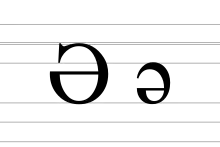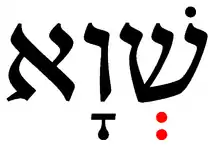Schwa
See also: schwa
German


The word shva (שווא) in Hebrew. The first vowel (marked with red) is itself a shva.
Alternative forms
- Sch'wa, Schva (rare, in Hebrew contexts)
Etymology
From Hebrew שווא \ שְׁוָא (sh'va ,š’vā, “nought”).[1]
Pronunciation
- IPA(key): /ʃvaː/
Noun
Schwa n (genitive Schwas or Schwa, plural Schwas or Schwa)
- (linguistics) schwa (mid central vowel sound)
- Synonyms: Indifferenzvokal, Murmellaut, Murmelvokal, Schwalaut
- Hypernyms: Mittelzungenvokal, Zentralvokal, Reduktionsvokal
- 1824, E. F. F. Chladni, “Über die Hervorbringung der menschlichen Sprachlaute”, in Annalen der Physik, number 76, DOI:, page 195:
- Ausser diesen 10 Vokalen giebt es noch einen den Vokalen etwas ähnlichen kurzen Laut, das Schwa, dessen aus dem Hebräischen entlehnter Name auch im Deutschen von einigen der besseren Schriftsteller beibehalten worden ist.
- Next to these 10 vowels there is one more short sound that is somewhat similar to the vowels, the schwa, whose name, borrowed from Hebrew, has also been retained in German by some of the better authors.
- 1876, Eduard Sievers, Grundzüge der Phonetik [Foundations of phonetics], Leipzig: Breitkopf & Härtel, published 1893, page 103:
- […] und meist wird auch wegen der Nachdruckslosigkeit der betreffenden Silben die specifische Articulation weniger correct ausgeführt, so dass schliesslich an Stelle aller Vollvocale unterschiedslos ein einziger Murmelvocal (der sog. unbestimmte Vocal, jetzt auch wohl schlechthin Schwa genannt) treten kann, […]
- […] and because of the lack of emphasis on the syllables in question the specific articulation is also usually carried out less correctly, so that in the end all fully-voiced vowels may be replaced indiscriminately by a single murmured vowel (the so-called indeterminate vowel, now also simply called schwa), […]
- shva (one of the nikud (Hebrew vowel signs))
- 1791, Heinrich Ernst Güte (editor), Anfangsgründe der Hebräischen Sprache, 2nd edition, page 25:
- Steht das Schwa im Anfange einer Sylbe, so heißt es mobile, das ist: es wird in der Aussprache etwas gehöret. Steht aber das Schwa am Ende einer Sylbe, so heißt es quiescens, das ist: es wird in der Aussprache gar nicht gehöret.
- 1856, C. H. Vosen, Kurze Anleitung zum Erlernen der hebräischen Sprache für Gymnasien und für das Privatstudium, 3rd edition, page 8:
- Das Schwa wird bald wie ein schwaches e ausgesprochen, und heisst dann Schwa mobile, bald wird es gar nicht gesprochen, und heisst Schwa quiescens.
- 1791, Heinrich Ernst Güte (editor), Anfangsgründe der Hebräischen Sprache, 2nd edition, page 25:
Declension
Usage notes
- The genitive singular and the plural can also be Schwa, especially in Hebrew contexts.
Related terms
- a-Schwa, a-Schwa
- e-Schwa, e-Schwa
- Schwa indogermanicum
- Schwa mobile
- Schwa quiescens
- Schwa-Laut, Schwalaut
- Tiefschwa
Further reading
References
- Schwa in Duden online
This article is issued from Wiktionary. The text is licensed under Creative Commons - Attribution - Sharealike. Additional terms may apply for the media files.